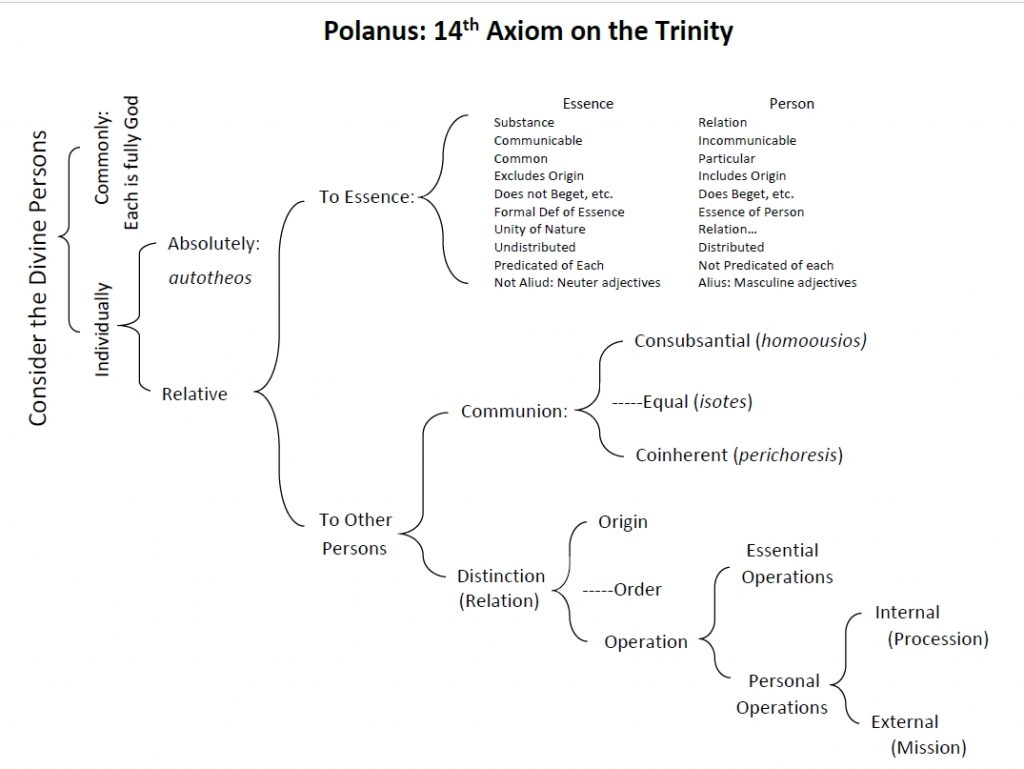
I think it’s fair to say this will not be one of the easier episodes, because Polanus lays out quite a bit of difficult material here, and it’s all interconnected. We are nearly done with the very long Axiom 14.
This sub-section of the axiom brings us to Polanus’ discussion of the order and the operations of the persons of the Trinity, or, to be more precise, it brings us to his discussion of how to consider each of the divine persons individually, relative to the other persons in their distinct relational order and operations. Here’s the chart:

We are all the way down at the bottom few brackets, and it’s crucial to remember that Polanus has already talked about the relations of origin; he presupposes their importance as he moves on to the order and operations of the persons. The other thing that’s crucial to remember is that he is committed to the inseparable external operations of the Trinity. He doesn’t reiterate the principle in every sentence, and he even kind of elides the difference between internal and external in one key formula below.
It seems to me the great benefit of this section of Polanus is not in his precision or even necessarily in his good order; both are a bit compromised in this episode’s passage. But even here, what’s instructive about Polanus is that he has all the key elements of trinitarianism up and functioning at the same time. It’s a kind of Protestant theology functioning within the great tradition of trinitarian reflection, and one we haven’t seen enough of in recent decades.
So here, first of all, is the text from this part of Axiom 14:
The order of persons is that whereby one person is prior to another in nature or cause. Thus one calls the Father the first person; the Son, the second; and the Holy Spirit, the third. And for that reason each are respectively first, second, or third in order of existing, because the Father is from no principle; the Son is from the Father as from a principle or cause; and the Holy Spirit is from Father and Son, as from one principle. But they are not first, second, or third in grade i.e. in superiority, excellence, eminence, dignity, and neither such in time. Incidentally, when Tertullian says the persons of the deity are not three in status but in grade, he thinks of “grade” as “order.” [1]
The distinction of persons with respect to their operation is twofold: it either concerns the order and way of acting in essential operations, or deals with personal operation.
The order of operations in the divine persons is as in being so in acting. Just like the Son exists from the Father, and the Holy Spirit exists from Father and Son, so also the will of the Father precedes in divine operations, the will of the Son follows, and the will of the Holy Spirit finalizes the will of both—not in time, but in order.
The way of acting in essential works is distinct in this way: the Father acts through the Son in the Holy Spirit. Said again, the Father acts from nothing; the Son acts from the Father (Gen 19:24; John 5:19, 30; 8:28); and the Holy Spirit acts from both (John 16:13).
For this reason, we attribute creation to the Father, not by something; our redemption to the Son; and our sanctification to the Holy Spirit; despite this, all of these works remain common to the Father, Son, and Holy Spirit.
Personal operation constitutes both an internal and external distinction of persons. For, just as the Father is said to be first from his internal and personal operation, the Father begets the Son and in so begetting him gives and communicates the essence, power, and all other essential attributes to him. The Son is born from the Father and receives the divine essence and all essential attributes of deity in his being born. And the Holy Spirit proceeds from Father and Son, thereby receiving from Father and Son the divine essence and all essential attributes of deity in his being spirated.
____________________________
[1] Tertullian, Against Praxeas
And here is the video:
No show notes this time: We got dangerously close to doing some text criticism, or at least edition-comparison. But we narrowly avoided it.